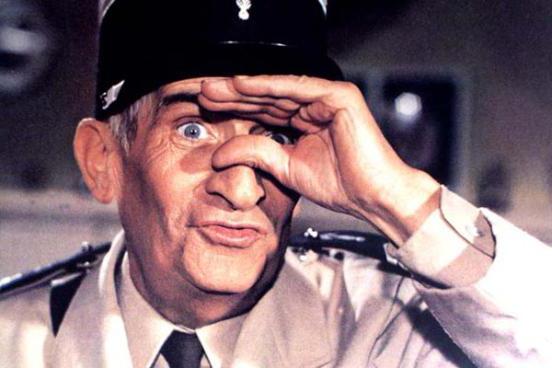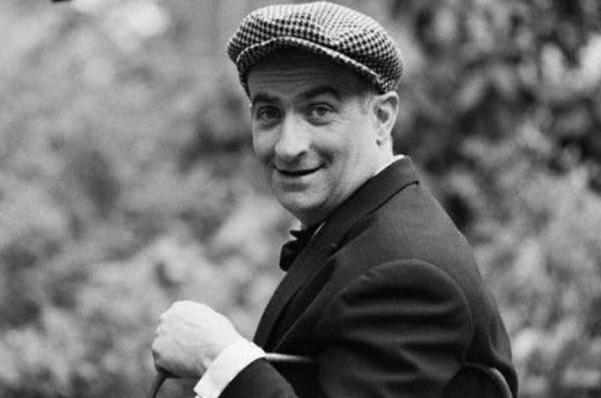This article will discuss a talented French comedian - the famous Louis de Funes. You will learn about his life path and significant events in his cinematic career.
Origin
Funes, Louis de, was born in 1914, on July 31, in the city of Courbevoie in France. His dad - Hispan Carlos de Funes de Galarza - was a descendant of an ancient aristocratic family from Seville. He learned to be a lawyer, but he has been cutting diamonds all his life . The mother of the future actor - Lenore de Funes - had Spanish and Portuguese roots, was a very temperamental and enterprising woman. She was the real mistress in the house of de Funes. The woman adored her restless and funny little son. Louis’s parents moved to France in 1904 to get married, as the parents of the lovers were against this marriage. Hispin opened a small jewelry store in a Paris suburb, the proceeds of which allowed the family of Funes to live comfortably on French soil.
Childhood
Funes, Louis de, in childhood received the nickname "Fufu." The boy knew English, French and Spanish well. The future actor drew and played the piano beautifully. Louis was kicked out for the lively and rebellious disposition from everywhere where he tried to earn extra money as a teenager. The future celebrity enthusiastically fished in the Seine and copied the tricks of the idol of his childhood - the ingenious Charlie Chaplin. About his cherished dream - to become a professional actor - the boy was afraid to speak out loud, fearing that his parents would not want to see their son as a simple hypocrite.
Louis constantly demonstrated his comic gift to classmates, tirelessly grimacing and mimicking teachers. The boy performed on the school theater stage, constantly chuckling and fooling around. In 1939, the future actor was released from military service due to poor health: a young man with a height of 1.64 m weighed 55 kilograms. However, a year later, Louis still ended up in a military camp, where he entertained fighters, performing popular songs to his own piano accompaniment.
First steps in a career
After the war, Funes, Louis de, began to conquer the cinema. He previously attended Rene Simon's drama courses. The aspiring actor made his debut in the film "The Barbizon Temptation" in 1945. This work was not very successful. Louis de Funes, whose filmography includes many works, the first 13 years starred in tiny episodic roles, not lingering in the memory of the audience. Only in 1958 he was lucky - he played a large role in Robert Yves film "Not Caught - Not a Thief." The image of the rogue and poacher Blairot made Louis famous. The artist was on the crest of success at forty-six years. One acquaintance de Funes complained about the slowness of the capricious Fortune, while others stated that the comic baggage acquired by him during the long journey to the goal allowed his acting talent to unfold in all its splendor.
At the zenith of fame

Funes de Louis acquired a strong role as a fussy and unlucky rogue. In the early 1960s, a fashion for eccentric comedies with elements of absurd humor, buffoonery and parody appeared in world cinema. The characters portrayed by Louis de Funes fit perfectly into this popular genre. “The Big Walk” (1966) and “Razinya” (1965) are paintings that made the actor famous not only at home, but also abroad. In them, Louis played in tandem with his best partner - Bourville. In 1967, the comedy film Oscar was released. Louis de Funes consolidated his success by playing a major role in the legendary multi-part film about the adventures of the provincial gendarme Crécheau. This was followed by the incredibly popular Fantomas trilogy, which won the hearts of millions of Soviet teenagers. At home, the actor was also appreciated. In 1968, Funes de Louis was recognized as the best actor. His fees grew to fabulous proportions, but at this time the first signs of a decline in the comedian's career began to be observed.

One image hostage
In 1970, Louis's irreplaceable partner, Bourville, died. New comedies with the participation of the actor rested, mainly, on the comedian's unique grotesque facial expressions, sometimes turning into outright antics. The type created by the artist is a character extremely unprincipled, conceited, absurd, greedy, stupid and antipathetic. He wants to deceive the whole world, but always remains in the cold. The image used by the comedian is a successful continuation of the traditions of French medieval farce and Italian comedy. Louis de Funes constantly depicts on screen the same social and national type as a collective image of all human vices and weaknesses. Such, for example, is his hero, Commissioner Juve. Suspicious and narcissistic idiot, now and then confronted with the fact that real life is not arranged at all as he imagines. Watching Juve's unsuccessful attempts to control the ingenious Fantomas, the audience had fun. For the opportunity to laugh at this unpleasant type, the audience paid Louis de Funes love and recognition. However, years passed, and the comedian remained a hostage of the same image.
Black line
Under the influence of incredible popularity, the character of Louis irreversibly deteriorated. Having unlimited power over producers, screenwriters and directors, the comedian shamelessly used it. He made the filmmakers dance to his tune, as if offsetting the long years of expectation and obscurity. But the audience still adored Louis de Funes.
In 1973, on March 15, the actor was awarded the Legion of Honor. After this event, a black streak began in the life of a comedian. In the spring of 1975, he had his first heart attack. This happened right on the stage during the play “The Waltz of the Bullfighters”. A few months later, Funes, Louis de, suffered another heart attack. The directors stopped inviting him to films for fear that the actor would die right on the set. The famous comedian was offended by the indifferent attitude of his colleagues, left Paris and settled in the castle de Clermont, standing on the banks of the Loire. There, the actor enjoyed serene peace and solitude, grew roses and fished.
Recent movie work
Director Claude Zidi's call interrupted this idyll. He invited Louis de Funes to star in the film “Wing or Leg”. The comedian agreed, but during the filming was under the vigilant supervision of doctors. By the role in this picture, the actor completed a series of grouchy swindlers and misers, in excess of which he embodied in the frame. The character of the famous artist completely deteriorated. He constantly quarreled with colleagues in the shop, became stingy and unbearable, like his on-screen characters. From now on, Louis de Funes, a gendarme from a terrific French comedy, smiled only at the camera, in life he became a dull and irritable old man. The actor called his directorial debut in the cinema, the adaptation of Moliere’s play “The Mean”, with his swan song and favorite picture. The comedian played the role of Gargapon superbly! If she appeared in the filmography of de Funes twenty years earlier, she would have laid the foundation for a completely different creative biography of the artist. However, the film was coolly received by the audience and did not pay off at the box office. In 1980, the great comedian was awarded the Cesar Prize for his contribution to world and French cinema.
Personal life
In 1936, Funes, Louis de, married Germaine Louise Elodie Carroyer. The couple had a son, Daniel, but after six years, the couple broke up. The second marriage of the actor was happier. Working as a solfeggio teacher at a music school, Louis met Jeanne Augustine de Barthelemy de Maupassant, the great-granddaughter of the famous writer. The girl could not help but reciprocate the "little man who played jazz like a god", and in 1943 the lovers got married. Jeanne and Louis lived together in grief and in joy, in illness and health for forty years, until the death of the great comedian in 1983. They had two sons - Olivier, who later became a civilian pilot, and Patrick, who chose the profession of a doctor for himself.
The final
Louis de Funes, films with the participation of which are watched in one breath, considered Jean Giraud to be his main director. It was with him that the actor created all the films about the gendarme from Saint-Tropez, as well as the films “Big Vacations” (1967) and “Cabbage Soup” (1981). Giraud's death dealt a crushing blow to the great comedian. He completely lost interest in life, stopped taking medications, checked accounts, did not answer phone calls and did not invite anyone to himself. His wife sometimes thought that he had forgotten the name of his beloved granddaughter. The only person Louis occasionally spoke to was Victor, the gardener. With him, the great artist had long conversations about growing roses, and sometimes went on the banks of the Loire to go fishing. In 1983, on January 28 in the morning, de Funes died of a heart attack.
Conclusion
The personal life of great people is always under the scrutiny of the public. In 2007, the memories of the artist's sons about his famous father were published. In a book called Louis de Funes. Do not talk too much about me, my children ”the unsightly sides of the artist’s character were stated. However, this man managed to raise the comedy genre to a new, hitherto unknown level. And many fans of Louis de Funes love and remember him to this day.